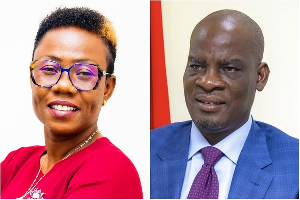Accra, Sept. 5, GNA - Papa Owusu-Ankomah, Minister of Trade, Industry, Private Sector Development (PSD) and President's Special Initiative (PSI), on Thursday announced that government might be compelled to ban the importation of second hand clothing if importers did not comply with laws and rules guiding their importation. He said government did not want to ban such items because it could affect the jobs of some people but it was in the general interest of the ordinary Ghanaian consumer since second hand underwear like panties and braziers could affect the health and safety of buyers.
"It would be wise if importers would separate second hand shirts from panties and not give the excuse that they could do nothing about that by thinking only about the profit they stand to gain," Papa Owusu-Ankomah said.
The Minister was speaking at the First Importers Forum organized by the Ministry in collaboration with Ghana Standards Board, Customs, Excise and Preventive Service and other regulatory agencies. The forum would help importers understand their roles better and know the impact of their activities on the economy of Ghana. Papa Owusu-Ankomah said the country had challenges with the proliferation of sub-standard goods and pointed out that there had been a lot of complaints from local manufacturers about the importation of cheap and sub-standard goods while importers complained of high prices associated with locally manufactured products.
He mentioned food products, cosmetics, pharmaceuticals, LPG cylinders and accessories, petroleum products, electrical and electronic products and African textiles prints as "High Risk Goods". The minister explained that the high risk goods had serious health and safety implications on the consuming public and stressed the need for stakeholders to understand each other's mandate and role to allow for smooth operations at the port of entry.
Mr Adu Darkwa, Executive Director of the Ghana Standards Board, said his organization had problems with non-compliance with existing rules and regulations, smuggling of goods through unapproved routes, counterfeiting and piracy and non-compliance with the standards of business.
Emphasizing the importance of standards to sustainable development in the country, he said, "standards are the backbone of a national quality infrastructure".
Mr Darkwa said there was the need for importers to comply with standards to facilitate trade through the promotion of safety, quality and compatibility while helping the domestic market to operate effectively.
"Standards increases competitiveness, provide an excellent source of technology transfer to developing countries as well as contributes to basic infrastructure that underpins society including health and environment."
Mr Darkwa noted that there were legislations that banned importation of used goods such as handkerchiefs, mattresses, sanitary wares and underpants for commercial purposes yet such goods were being sold openly on our markets. Quoting section D of the Import Declaration Form (IDF), Mr Darkwa said, "It is the responsibility of the importer to declare all relevant standards applicable to goods covered in the IDF and to advise his suppliers of same."
He advised importers to know the relevant standards of specifications required before committing themselves to importation. Professor Kofi Agyekum of the Department of Linguistics at the University of Ghana, who spoke as an ordinary consumer urged importers to be polite to their consumers by importing acceptable goods which were of good quality and satisfied human needs better. "Politeness means being considerate and having the plight of consumers in mind," he said. 5 Sept. 08
Business News of Friday, 5 September 2008
Source: GNA
Ban on importation of "Obroniwaawu"
Entertainment











